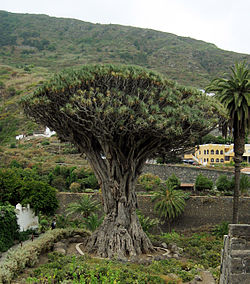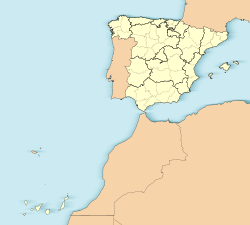Icod de los Vinos
| Icod de los Vinos | ||
|---|---|---|
| Municipality | ||

Drago Milenario
|
||
|
||
| Location in Spain | ||
| Coordinates: 28°21′N 16°42′W / 28.350°N 16.700°W | ||
| Country |
|
|
| Autonomous Community |
|
|
| Province | Tenerife | |
| Island | Tenerife | |
| Government | ||
| • Mayor | Juan José Dorta | |
| Area | ||
| • Total | 95.9 km2 (37.0 sq mi) | |
| Elevation(AMSL) | 235 m (771 ft) | |
| Population (2013) | ||
| • Total | 23,092 | |
| • Density | 240/km2 (620/sq mi) | |
| Time zone | CET (UTC+0) | |
| • Summer (DST) | CEST (GMT +1) (UTC+1) | |
| Postal code | 38430 | |
| Area code(s) | +34 (Spain) + 922 (Tenerife) | |
| Climate | BSh | |
| Website | www.icoddelosvinos.es | |
Icod de los Vinos is a municipality in the province of Santa Cruz de Tenerife on the island of Tenerife, in the Canary Islands (Spain), located in the northwest part of the island. Inhabitants of Icod are known in Spanish as "icodenses".
Icod has an area of 95.90 km², is situated at an altitude of 235 metres above sea level, and has a population of 23,092 as of 2013.
Icod de los Vinos is located on a continuous smooth slope that stretches from the extensive forests of Canary Island Pine down to the sea, and has almost 10 km of shoreline. The city is surrounded by fertile valley, and its streets and corners offer views of the volcanic mountain Teide, as well as dense pine forests which descend from its summit to Icod's higher-altitude districts. Its banana plantations, orchards and vineyards give rise to a lively commerce. The valley is a fertile and agriculturally rich comarca, as shown by the town's full name, Icod de los Vinos (Icod of the Wines).
Icod de los Vinos is located about 47 km west of the capital, Santa Cruz de Tenerife.
Founded in 1501, the city is a collection of seigniorial houses, ancient palaces, churches and convents.
The name comes from the former menceyato of Icoden, together with a reference to the local wine (vino in Spanish). The Spanish conquerors were quick to colonize this fertile and well-watered region, and introduced the cultivation of sugarcane and grapevines; the latter came to predominate.
In the Plaza de Lorenzo Cáceres stands the monument to General José Antonio Páez, founder of Venezuela's independence, whose great-grandfather came from Icod. The town's neighborhoods are sprinkled with innumerable hermitages and other buildings that give Icod great symbolic and artistic value, which can be appreciated at the Museo de Arte Sacro in the church of San Marcos.
...
Wikipedia


